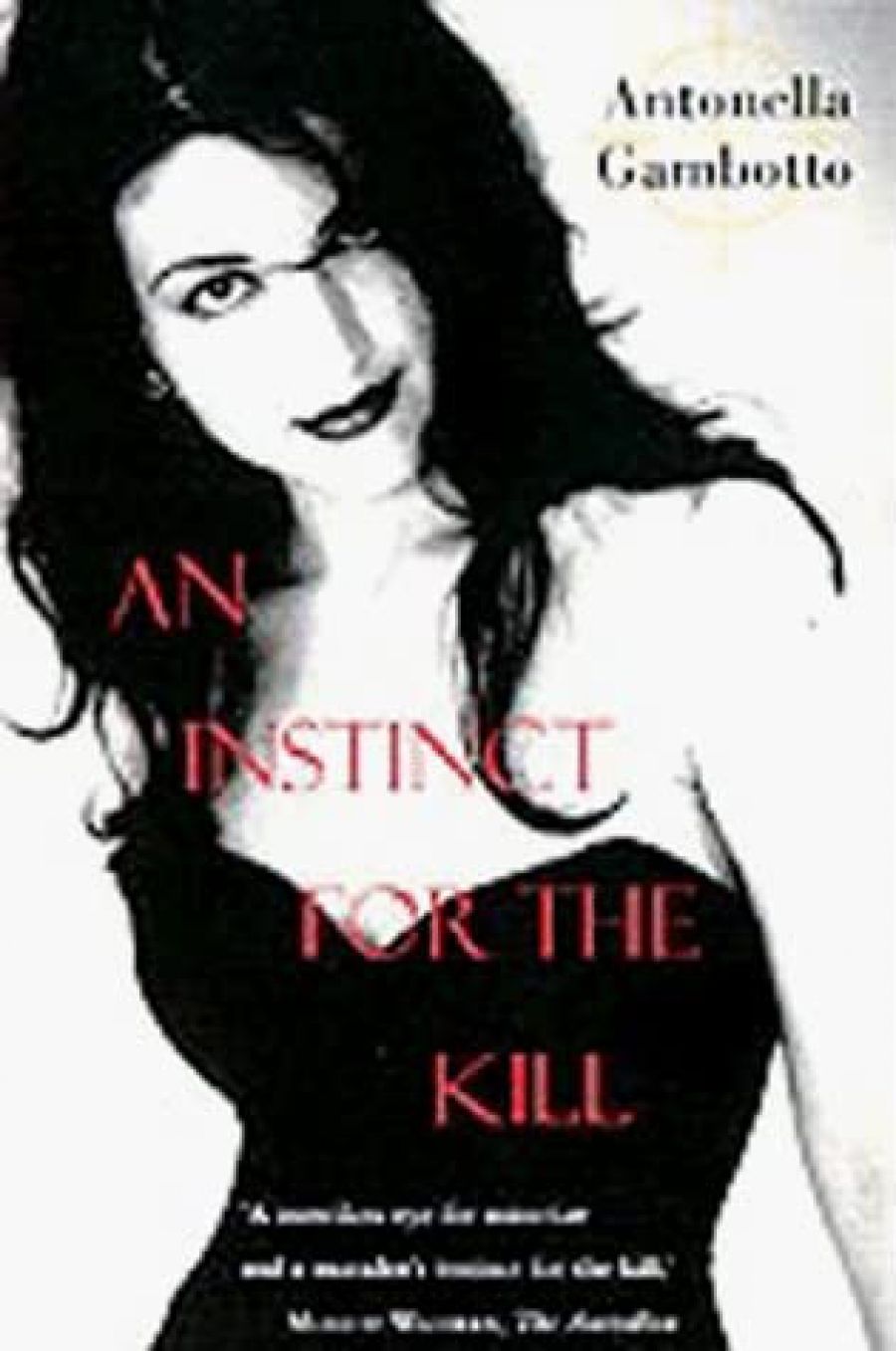
- Free Article: No
- Contents Category: Essay Collection
- Review Article: Yes
- Online Only: No
- Custom Highlight Text:
If Antonella Gambotto hadn’t been sued by Cliff Richard early on in her career, would she have later described Kylie Minogue as ‘a charmlessly robotic dwarf’ under the impression of being an ‘incandescent, gifted and alluring siren’? Perhaps not. It seems it was Cliff, the 50,000 pounds and the resulting barrow-loads of letters that convinced Gambotto of the value of opinion pieces: people react.
- Book 1 Title: An Instinct for the Kill
- Book 1 Biblio: HarperCollins, $17.95 pb, 339 pp
In this collection of interviews, reviews and articles, titled An Instinct for the Kill, it doesn’t matter whether she is talking to Charlton Heston, Jerry Hall, Erica Jong or Jeffrey Archer: Gambotto’s aim is to reveal the human behind the name. By what appears to be a mixture of charm, cunning and a staunch refusal to play the coy sycophant, Gambotto does generally uncover a flesh and blood person. But she’s not a publicist’s delight. The problem is that she has a nasty habit of actually writing what she sees. To Gambotto this is simply a case of breaking the silence of middle-class Anglo reticence. To her subjects it can appear more sinister and, it seems, deeply threatening: apparently there was a, well not serious, rather silly in fact – catty even – attempt to damage her credibility as the rights for her first collection were being auctioned. Not that calling it Lunch of Blood was in any way provocative ...
She hasn’t softened since then. ‘He is still handsome in a dead sort of way’, Gambotto writes of the musician Iva Davies, ‘and deeply tanned. His eyes are pale and reptilian, his teeth are those of a ferret’s (sic), and he is near-lipless’. Clearly harsh, but fair? Well, as far as I can make out his only crime is to be pretentious – but heck, he’s an ex-pop star – and somewhat inarticulate – ditto. However, it soon becomes apparent, these are two things Gambotto can’t abide. Be vulgar, be brash, be sleazy – but be a foolish poseur and beware.
Nor is integrity any protection from ridicule, as the Cappers (Warwick the footy player and Joanne the centrefold) discovered. The couple invite her into their home, take her on an enthusia tic tour and even offer her refreshments and compliments. ‘Yew must be doying fer a cawld drink,’ Joanne kindly says. ‘Oi’ll make yew a crime cordial.’ And ‘Warwick’s eyes are glued to my breasts. “Nice big ones,” he breathes, “could be in Penthouse with those, couldn’t she, Joanne?’ Yet despite being shown as brazen, naïve, and prone to malapropisms, what finally comes across is the Cappers’ devotion to each other.
Gene Simmons, the one with the tongue from the glam rock group KISS, is shown as devoted to himself. And sex. Or rather himself and sex. The word is that he’s slept with ‘over 3000’ women. When he meets Gambotto he’s recovering from a night with Miss Nude Australia (though she claims no knowledge of this tryst). What is intriguing is that he is at one with his image. So, despite his fans looking ‘like nothing so much as watertower snipers and Internet perverts’, the overall tone of the interview implies a certain respect for the man, despite his uncontrollable leering.
Perhaps unsurprisingly the least lively interviews are those where there is no personal friction; where the interaction is on a more cerebral level. When Deepak Chopra talks earnestly about healing or Tori Amos about brutal life experiences what you get is Chopra or Amos. No Gambotto: these are interviews any journalist might have done. Too much respect and seriousness and the colour is gone. This is also the case with the articles and speeches, on subjects ranging from journalism to suicide to pornography. (Speaking of porn, while loudly railing against it on the one hand, I did notice that Playboy and Penthouse nestle in quietly amongst the list of magazines in which she’s been published.) The articles are eloquent and logical and the personal is used to articulate the political but ... but ... they are also restrained, self-consciously clever, and have the grating sound of someone trying a little too hard.
If her writings on abstract subjects seem cool, her book reviews are the reverse. Breathtakingly blunt, they take the Dorothy Parker approach. ‘Releasing the Inner Moron’, her review of Stephanie Dowrick’s best-selling Intimacy and Solitude states ‘the problem with this book is neither intimacy not solitude, but the intellect which tackled them. Just as it is inadvisable to attempt to tame a tiger with a spatula ...’ Another simply ends with ‘Pass the bucket, please’.
At twenty-three Gambotto became a member of British MENSA. This little piece of information is in the author note – on the first page of the book – and I wonder at the significance of its inclusion. Perhaps she is of the Sharon Stone (yep, MENSA too) school ‘Please don’t hate me because I’m beautiful, hate me because I’m smart as well.’ Or could it be that, despite her evident success, ability, and attacks on the notion of news journalistic objectivity, she is insecure about the path she has taken, exploring torrid emotional terrain, rather than making despatches from muddy war-torn fronts (like the ‘lemonhaired, current-affairs bollard-thighed troll’ who – possibly unfavourably – reviewed her last book)?


Comments powered by CComment